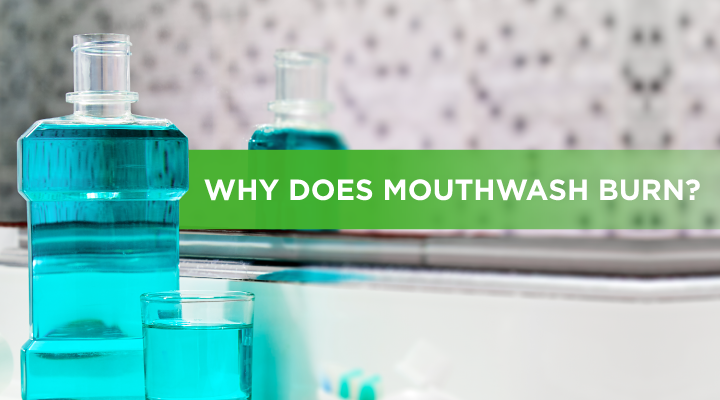
Why does mouthwash burn? If you’re one of the many who feel a sting when they swig, you’re not alone. The minty fresh mouth you get as soon as you gargle is great, but is mouthwash supposed to burn? It’s good to feel the burn when you go to the gym, but what about when you rinse?
So why does mouthwash burn so bad? Blame one or more of these culprits:
Alcohol
Alcohol is a common component in commercial rinses. Alcohol has the ability to kill germs, but there’s not enough in mouthwash for that to happen. Instead alcohol acts as a vehicle for other ingredients, in addition to its role as a preserving agent.
Alcohol can dry out your mouth. And some mouth rinses contain high levels—ranging from 18% to 26%.
If you ever wonder, “Why does mouthwash burn my tongue?”, thank alcohol. In addition to causing a stinging sensation in your tongue, alcohol can cause burning in your cheeks, teeth and gums. Consistent mouthwash use can further bring on the burn, leading to irritated mouth tissue and sores. Ouch!
Menthol
Menthol is in toothpaste, gum—and of course—mouthwash. Sourced as an oil primarily from peppermint, menthol’s strong, minty flavor can make your mouth tingly and cold. And rinses with high levels are likely to sting the strongest. Menthol is used in dental products because it’s an antimicrobial, meaning it kills bacteria and stops their growth.
Not all mouths are created equal—some may experience more sensitivity than others. Brush up on these mouthwash basics to will help you choose what works best for you and your grin!
Types of Mouthwashes:
- Cosmetic Mouthwashes: These may control bad breath and leave behind a pleasant taste, but they have no chemical or biological function beyond their temporary benefit. They do help dislodge food debris stuck in teeth when you swish, which can help reduce the risk of tooth decay. Keep in mind, if a product doesn’t kill bacteria associated with bad breath, its benefit is considered to be solely cosmetic.
- Therapeutic Rinses: Depending on the formulation, these are available over the counter or with a prescription. These can help reduce and control plaque, gingivitis, bad breath and tooth decay. Therapeutic rinses can also be called antiseptic, anti-plaque, anti-gingivitis, or anti-cavity—depending on their focus. Most can be purchased over the counter, but some prescription strength rinses, like chlorhexidine, require a prescription.
Smile Summary: Pros and Cons of Traditional Mouthwash
PROS
- Mouthwash use, combined with daily brushing and flossing, can reduce gingivitis and plaque
- Swishing can remove cavity-causing crumbs
- Temporarily prevents bad breath
CONS
- Menthol and alcohol can aggravate mouth ulcers. Menthol irritates the wounds and alcohol’s drying properties can slow down your healing process.
- Dries out your mouth, sometimes making bad breath worse
How can you solve the mouthwash burn? Get back to basics—a consistent brushing and flossing routine can work wonders for your oral health. If you prefer the whole suite of smile tools, look for a therapeutic, alcohol-free mouthwash with low amounts of menthol.
If you experience an adverse reaction to a mouth rinse, stop using it and ask your dentist for a recommendation.
More on oral health products:

